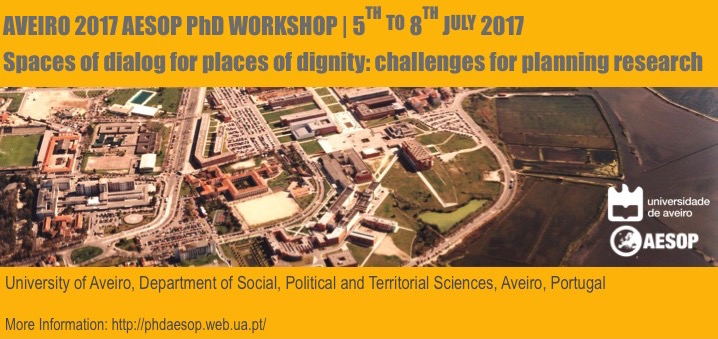The 2017 AESOP PhD Workshop, with the theme Spaces for dialog for places of dignity: challenges for planning research was organised by the University of Aveiro - Department of Social, Political and Territorial Sciences and took place from the 5th to the 8th of July 2017 in Aveiro.
Local Organising Committee:
Paulo Silva, Chair of the LOC
Teresa Fidélis (co-Chair)
Artur Rosa Pires (co-Chair)
Aoife Doyle (Young Academics Network Representative)
Carlos Rodrigues
Eduardo Anselmo de Castro
Fernando Nogueira
Frederico Moura e Sá
Gonçalo Santinha
João Lourenço Marques
José Carlos Mota
José Manuel Martins
A group of mentors from different universities and tutors from the university of Aveiro were invited to discuss PhD researchers’ work.
Mentors:
Alessandro Balducci (Polytechnic of Milano)
Artur da Rosa Pires (University of Aveiro)
Benjamin Davy (Technical University of Dortmund)
Carlos Rodrigues (University of Aveiro)
Eduardo Castro (University of Aveiro)
Huw Thomas (University of Cardiff)
Lia Vasconcelos (New University of Lisbon)
Nurit Alfasi (University of Ben Gurion)
Patsy Healey (University of Newcastle)
Stefanie Dühr (Radboud University)
Teresa Fidélis (University of Aveiro)
Tutors (University of Aveiro):
Fernando Nogueira
Frederico Moura e Sá
Gonçalo Santinha
João Marques
The call for the 2017 AESOP PhD Workshop generated almost 70 applications, among candidates originally from Europe, Asia, Africa, South America and Oceania. After the process of selection was concluded, the group of participants was composed by 33 PhD researchers from 21 nationalities, studying in 25 universities from 15 countries, most of them in Europe (we had one participant from Curtin University, Australia and one from the Technion – Israel Institute of Technology, Israel).
Following the congress theme, the workshop adopted the name “Spaces of dialogue for places of dignity – challenges for planning research” and was structured by three subtopics: the natureof the normative dimension of planning; spatial planning and multi-scalar complexity; planners and the dialectics between planning and the role of the State. More than application submissions that “fit” into these topics we aimed that they could inspire debate about the content, the methodology and the objectives of students’ PhD research projects.
The aim of the PhD workshop was to promote a lively meeting for three days, creating the space for the share of experiences and thoughts and to allow positive contributions to each PhD researcher.
Subtopics:
-
The nature of the normative dimension of planning; challenges for planning research. The design of norms and rules play a central role in planners’ work and the aim for equity and justice is very much part of it. As planning evolved in its nature, scope and purpose, namely through the incorporation of strategic perspectives, there is a need to reconceptualise the normative dimension. Louis Albrechts, for instance, argues that “the normative dimension inscribed in strategic spatial planning is of an ethical nature”. During the workshop tutors will be invited to discuss normative related issues regarding students’ research projects.
-
Spatial planning and multi-scalar complexity: challenges for planning research. Spatial planning in specific territorial contexts are nowadays facing a diversity of circumstances deeply rooted in multi-scalar dimensions – from the very nature of the problems, through legislative framework and knowledge flows, to policy guidance and decision- making processes. At the same time, planning is required to be responsive to territorially-based communities and stimulate public participation and civic engagement. During the workshop tutors will be invited to address the challenges for planning research of this complexity.
-
Planners and the dialectics between planning and the role of the State: challenges for planning research. In a dynamic setting in which planning is performed the role of the state remains critical, as in most contexts planning is traditionally seen as an activity of public concern. Planners, as professional and individuals, are often caught within the tensions between the aims of the planning systems and changing perceptions about the nature and role of the State, as well as between the need for transformative changes and the deeply embedded cultural attitudes. During the workshop tutors will be invited to address these tensions in terms of challenges for planning research.


